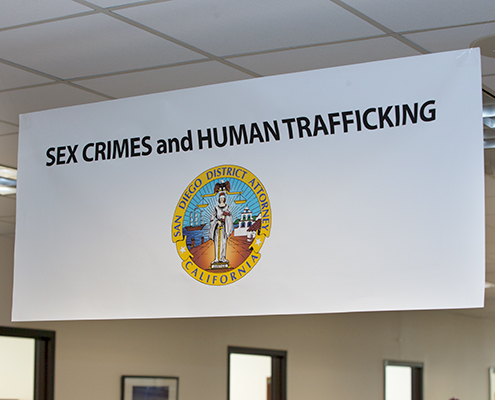| 2018 Staffing | |
|---|---|
| Attorneys | 18 |
| Investigators | 7 |
| Paralegals | 4 |
| Support Staff | 4 |
| Total | 33 |
The Sex Crimes and Human Trafficking Division is comprised of a highly-trained and specialized team of Deputy District Attorneys, District Attorney Investigators, paralegals and secretaries who are all dedicated to the fair and equal prosecution of perpetrators of sexual assault and human trafficking crimes. Guided by Division Chief Patrick Espinoza and Assistant Chief Kate Flaherty, the division strives to treat the victims of sexual assaults with compassion, dignity and respect.
Attorneys and staff in this division handled a number of significant cases including prosecutions for sexually-motivated homicide, sexual assaults by strangers, acquaintances or family members, lewd acts with children, non-domestic violence stalking, human trafficking, pimping, pandering, failing to properly register as sexual offenders, indecent exposure and civil commitments of sexually-violent predators.
Human trafficking prosecutions are filed primarily in conjunction with pimping and pandering charges. Felons, intent on profiting from this illicit business, seduce vulnerable young women and minors into prostitution throughout San Diego County. In addition to prosecuting offenders, the division works with law enforcement and community-based organizations, which try to rehabilitate victims and re-integrate them back into society. The division has one Deputy District Attorney and two District Attorney Investigators assigned full-time to the San Diego Human Trafficking Task Force, a multi-agency organization which seeks to disrupt and dismantle human trafficking in the county through a comprehensive, collaborative and regional response.
The division is committed to protecting the community from sexually-violent predators through the pursuing civil commitment petitions resulting in hospitalization and treatment of offenders found to be a substantial danger to the public. The division works to keep the public safe and informed as sexually-violent predators reach the community treatment phase through community notification and public meetings.
In 2018, there was major progress initiated by DA Summer Stephan in testing the rape kit backlog. With the law and individual agency policy evolving, the office sought to get ahead of any legislative mandate by joining in partnership with the San Diego County Crime Laboratory to inventory all local untested rape kits. About 1,500 untested kits were identified across the County between the crime lab and contract law enforcement agencies. At the time of publication, 905 rape kits have been sent to a private laboratory for testing, and results have been received on 559 kits. A total of 21 offender DNA profiles have been uploaded into the national database. The District Attorney’s Office has created a unique database to track the results of every kit sent for testing. Once the backlog is cleared, the goal is to encourage all agencies to test all kits in a timely manner to maximize their usefulness in solving criminal cases.



